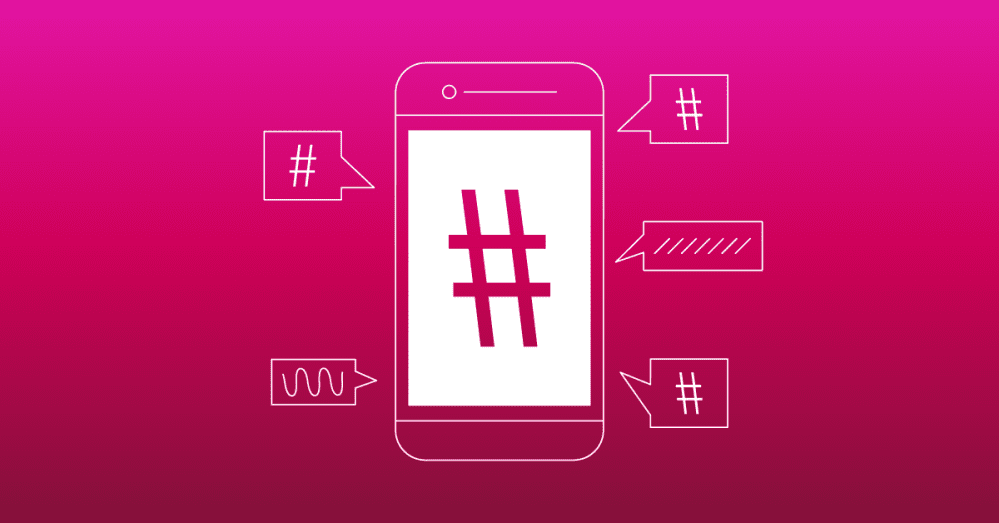The hashtag symbol has been synonymous with social media platforms for probably about as long as you can remember. We’ve seen the rise of their popularity, but are we now seeing their downfall?
If you’ve been asking yourself, “are hashtags dead?” lately, you’re not alone. The role of the hashtag has been a hot topic for marketers and small business owners this year. So, do hashtags still matter on Instagram, Facebook, and other social media platforms?
The short answer—yes. But let’s break it down even further.
[Related: Does Your Local Business Need to Be on Facebook?]
What is a hashtag?
First, let’s start with the basics… what even is a hashtag? Hashtags are words, phrases, or even numbers following the hashtag (#) symbol. They’re metadata tag operators (which is just a keyword or term assigned to a piece of information online) that categorize and track content on social media.
By using hashtags on your social media posts, you make it easier for your posts to be discovered by users who are searching for that specific topic. Even if they don’t follow you. Hashtags can be placed anywhere in your post—beginning, middle, end, or even the first comment.
They can be a powerful tool that helps you increase reach and engagement for your small business.
How do hashtags work?
Hashtags are primarily for social media profiles like Twitter/X, Instagram, Facebook, YouTube, and LinkedIn. They work by grouping, tagging, and connecting a post shared on social media to a topic that is hashtagged. Like, #digitalmarketing or #smallbusiness, for example.
Hashtags are also clickable for the user and can be searched.
They first began on Twitter/X but have now been adopted by many other social media platforms like we already mentioned.
[Related: Social Media Management Tips for Small Businesses]
Are hashtags dead?
Depending on how much time you spend on social media, you’ve probably noticed a decline in hashtag usage over the last couple of years. It used to be nothing for a post caption to be followed by a whole slew of relevant (and maybe not so relevant) hashtags.
But that’s not the case anymore. And when you couple that with Instagram’s announcement in December 2024 that users would no longer be able to follow specific hashtags… well, one could easily assume the hashtag was on its last leg.
But the hashtag isn’t dead. The data even supports it. Tweets with hashtags get 2x more engagement than those without and Instagram posts that include at least one hashtag get an average of 29% more interactions for accounts that have less than 1,000 total followers. For small businesses on social media in 2025, hashtag use might not be a necessity, but it is a strategic marketing move.
The benefits of using hashtags
There are a few reasons why you’ll want to utilize hashtags for your small business’s social media posts. We’ll break them down:
- Increased reach - adding a relevant hashtag allows your post to be discoverable by audiences beyond your followers. When users outside your network see you’re posting about a subject that they enjoy, you’ll see an increase in followers and engagement. Studies show that social media posts with hashtags boost the engagement of your audience by about 12.6%.
- Community building - sometimes we get so wrapped up in the “business needs” of having a social media presence that we forget about the social aspect. Hashtags can help you build a community of like-minded people who can relate to your content.
- SEO impact - hashtags and SEO have something huge in common: the use of relevant words and phrases to increase your business’s visibility. Hashtags improve the searchability of your posts within social platforms and 61% of social users turn to Instagram and other platforms to find their next purchase.
The key to using hashtags on your small business’ social media platforms is putting together a well-thought-out strategy that uses hashtags to the advantage of your brand and business.
Things to consider when planning your hashtag strategy
We get it. You’ve seen the benefits of using hashtags on your social posts, and now you want to jump right into planning out your new strategy. But before you do, you’ll need to take a few things into account:
- Caption or comment? – you’ve probably seen accounts place hashtags in both the post caption and the first comment of a post—so which is better? Either one. Instagram specifically has confirmed that hashtags are just as effective in either place, and neither placement will hinder discoverability. So, it’s really up to you. The only thing you might want to consider when deciding on your strategy is your timeline. Hashtags in the first comment will need to be done manually and as soon as the post is published. If you use a scheduling tool, this might not be as feasible for you.
- How many hashtags should you use? – when it comes to how many hashtags to add to your social posts, the general rule of thumb in 2025 is, “less is more.” When posts have too many hashtags, they can come across as spammy, annoying, and can hurt your engagement. Research suggests about 3-5 hashtags per post is the sweet spot. The key is making sure they’re relevant to your business and audience.
- Shadowbanning – shadowbanning is when a social media platform blocks or partially blocks your posts from being seen by others without your knowledge. Using too many or irrelevant hashtags in your posts can cause your profile to be shadowbanned. This is usually because the platform perceives you as a bot or spam account. This is why the previous tip is so important.
How to successfully use hashtags
To make sure your social media hashtag strategy is as successful as possible, here are a few things to keep in mind:
- Keep up with the trends – this might sound cliché, but trends play a huge role in social media algorithms. Take viral online movements for example. Many of them included their own hashtag in order to connect users who were part of the movement or wanted to share their support. Things like the ALS #icebucketchallenge, 2012 hurricane #Sandy, #ProtectOurWinters to bring climate change awareness, and #SaveOurOceans. Of course, not all trending hashtags will be attached to large causes like this. Things like #FYP, #explorepage, and #trending get major reach as well.
- Pay attention to which ones are working – just like you monitor your email and ad campaigns, you’ll want to monitor your hashtag usage as well. Keep a close eye on which ones are getting you the most reach and attracting the right people to your business.
- Create your own – want to really create a connection with your business and followers? Create your very own hashtag. Not only can you use it across all your social media platforms, your customers and followers can use it as well. It’s a great way to track user-generated content (UGC) and keep track of business sentiments.
- Be mindful of length – remember that hashtags are both words and phrases. Similarly to how long-tail keywords can be more beneficial to your SEO efforts, longer hashtags tend to be better than shorter ones. Hashtags with 21-24 characters do better than those with more or less characters and create a less competitive space. Keep this in mind when creating your own hashtags or deciding which of the trending ones to use.
How Hibu can help with your social media marketing
You have a lot on your plate as a small business owner, and creating a brand new hashtag strategy is just one more thing to add. So, while you’re busy doing that, let us handle some other aspects of your social marketing.
If you don’t already have a Facebook page, we can help you create one complete with your logo, business details, and photos. As a Meta Business Partner, we can also take your social media presence a step further by creating social ads that will appear in customers' Facebook News Feed, on Facebook Messenger, Marketplace, and Instagram.
And our expertise doesn’t stop there. Our digital marketing solutions are designed to work together to get you real results for your small business. Interested in learning more? Call us today at 877-237-6120 or complete our short Get Started form for a free, no-obligation consultation.



